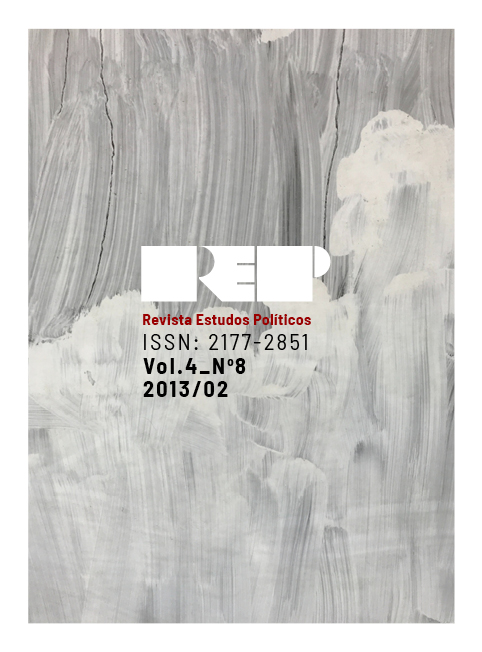Violão de Rua [Street guitar]: a bibliographical note
DOI:
https://doi.org/10.22409/rep.v4i8.40318Resumo
Violão de Rua was edited by publishing house Civilização Brasileira jointly with the Cultural Popular Center (CPC) and the National Student Union (UNE), as a three-piece series between 1962 and 1963. Revista Estudos Políticos here reissues them in a fac-simile edition. This piece belongs to what has been dubbed popular revolutionary art, to use the terms of the CPC manifest of August 1962. Rejecting art as “an incommunicable island far-removed and from material processes”, the CPC intellectuals (cepecistas) evinced a militant art experiment, averse to the compromises of aesthetic formalism with the objective to provoke within the Brazilian an understanding of the world imbued with a sense of urgency. The assumption was that once all ties of inconsistency were undone the conditions would be ripe for the overcoming of the “limits of the present oppressive material situation” (Manifesto CPC, 1962). Violão de Rua was the literary face of this revolutionary endeavor that brought together different artistic fields as music, theater, cinema and visual arts. The document provides an interesting entryway into the atmosphere of radical politics before the military coup. No sooner had the new regime been installed, in the first days of April 1964 the UNE main office was burnt to ashes and the CPCs extinct.Downloads
Downloads
Publicado
Edição
Seção
Licença
Para submeter um manuscrito, os autores devem realizar o cadastro na plataforma, fornecer os dados solicitados e seguir as orientações recomendadas. Para tanto, será necessário apresentar o número da identidade de pesquisador. Para obtê-lo, é necessário realizar o cadastro na plataforma Open Researcher and Contributor ID (ORCID).
Ao submeter um manuscrito, os autores declaram sua propriedade intelectual sobre o texto e se comprometem com todas as práticas legais relativas à autoria. A submissão implica, ainda, na autorização plena, irrevogável e gratuita de sua publicação na REP, a qual se responsabiliza pela menção da autoria.
A REP tem acesso aberto e não cobra pelo acesso aos artigos.
Orientando-se pelo princípio de que tornar público e disponibilizar gratuitamente o conhecimento científico contribui para a democratização mundial do conhecimento, a REP adota a política de acesso livre e imediato ao seu conteúdo.
No mesmo sentido, a REP utiliza a licença CC-BY, Creative Commons, a qual autoriza que terceiros distribuam, remixem, adaptem e criem a partir do trabalho, inclusive para fins comerciais, desde que se reconheça e torne público o crédito da criação original.
Para mais informações, contatar a editora através do e-mail revistaestudospoliticos@gmail.com


